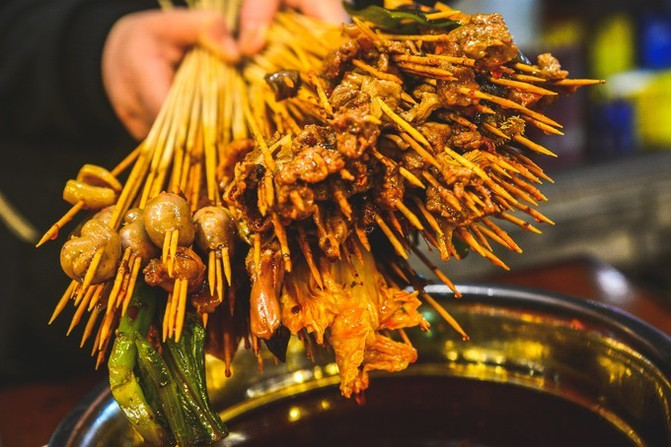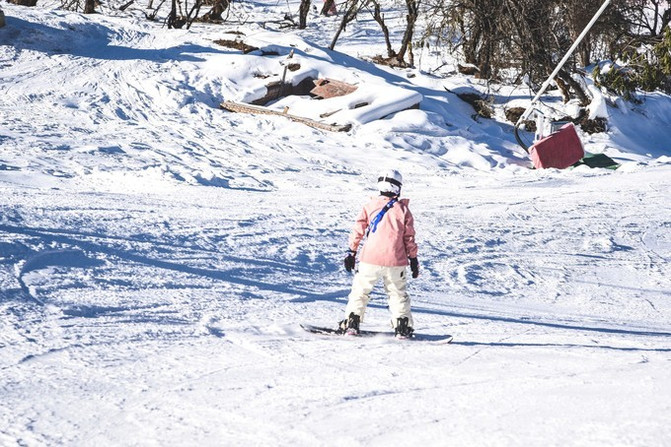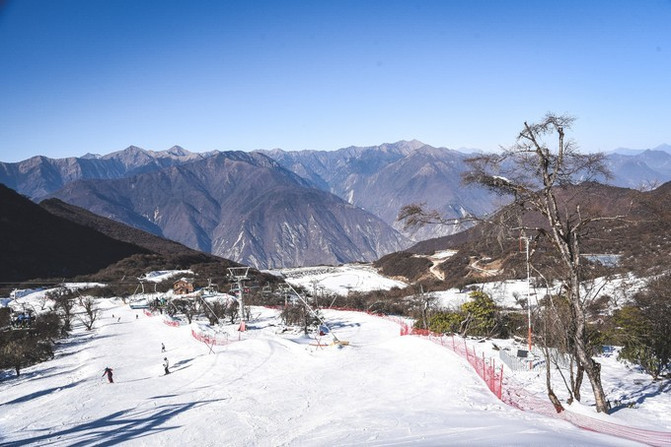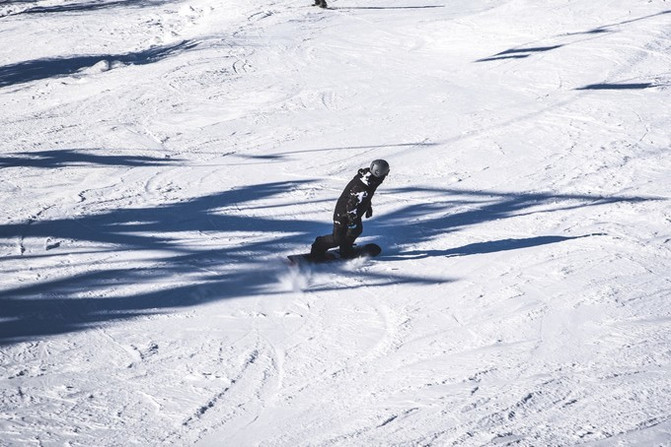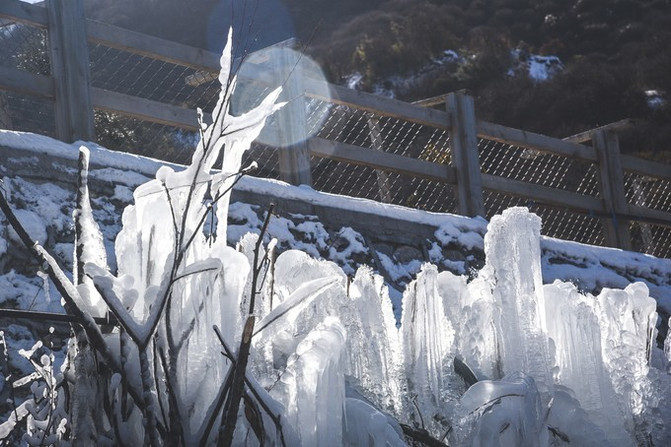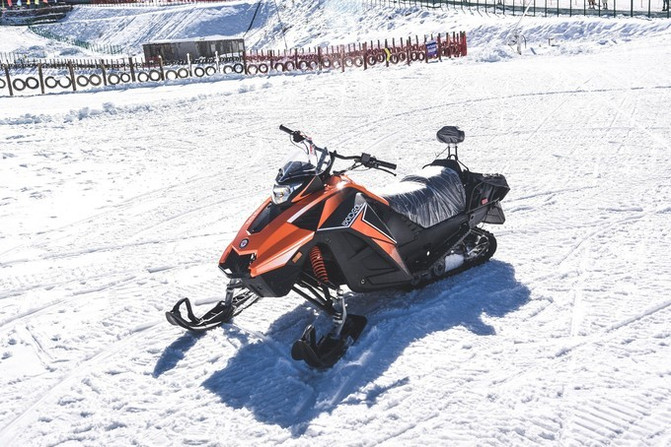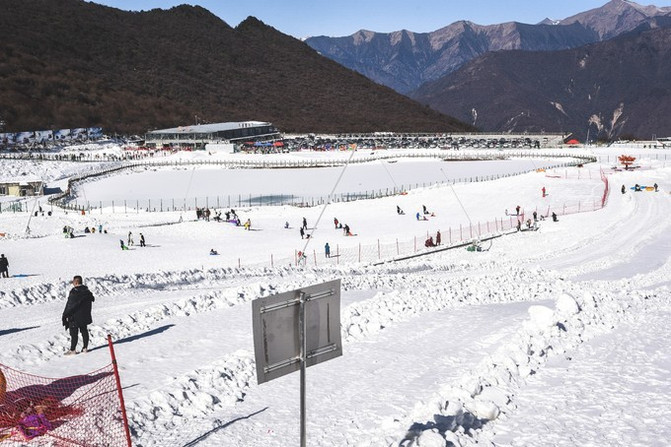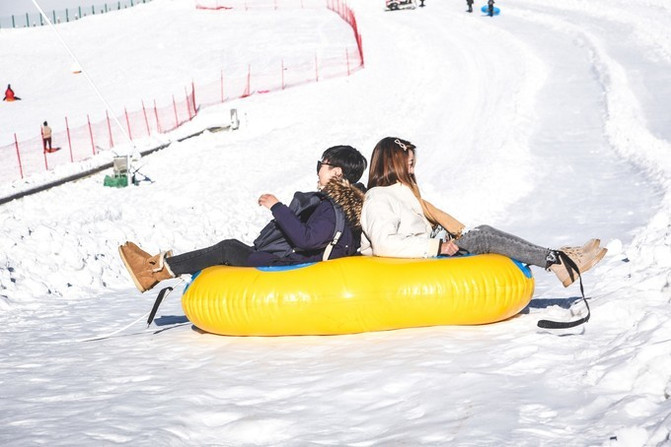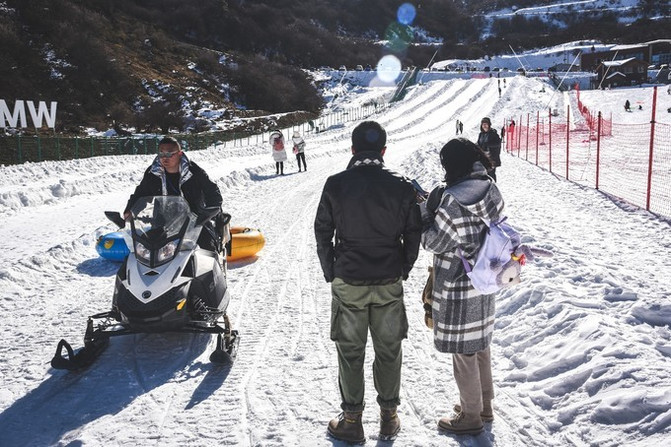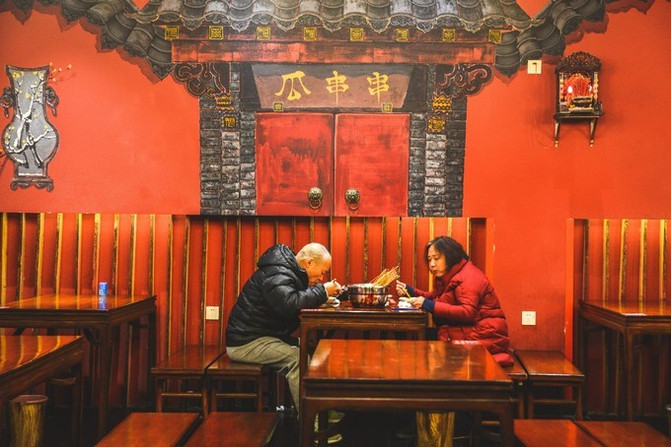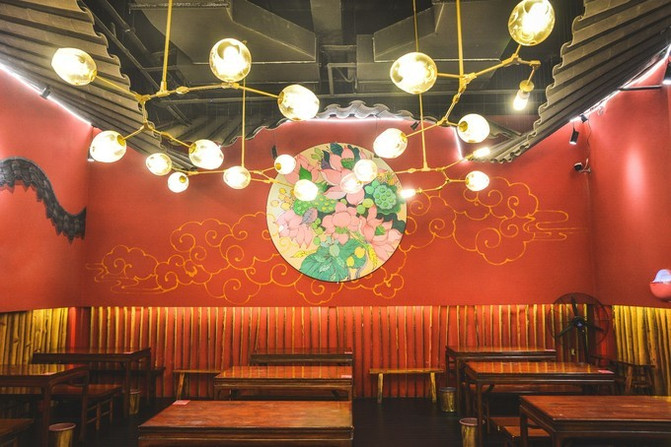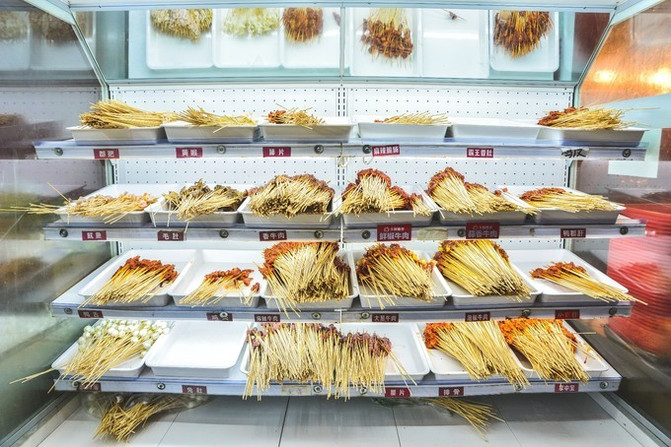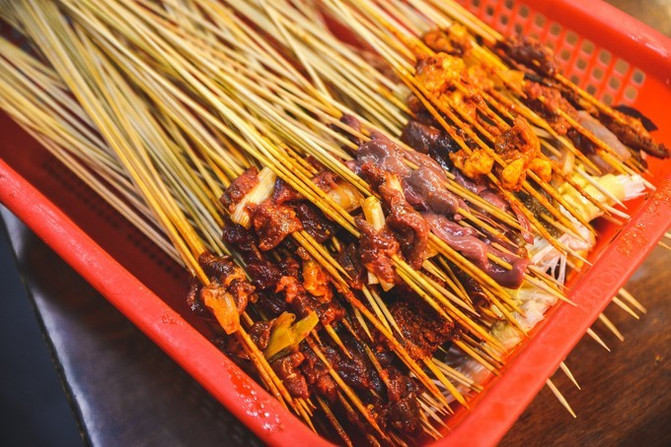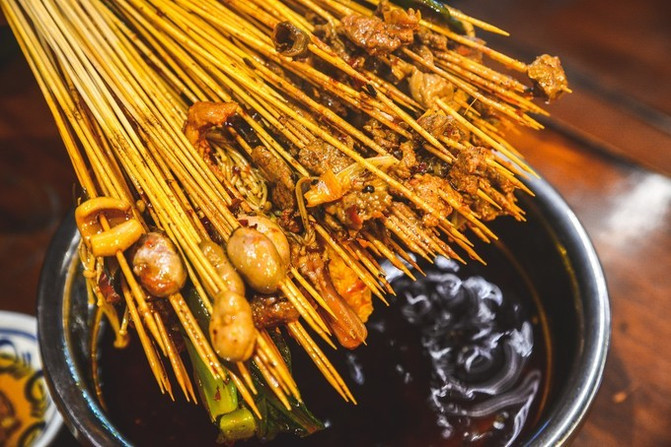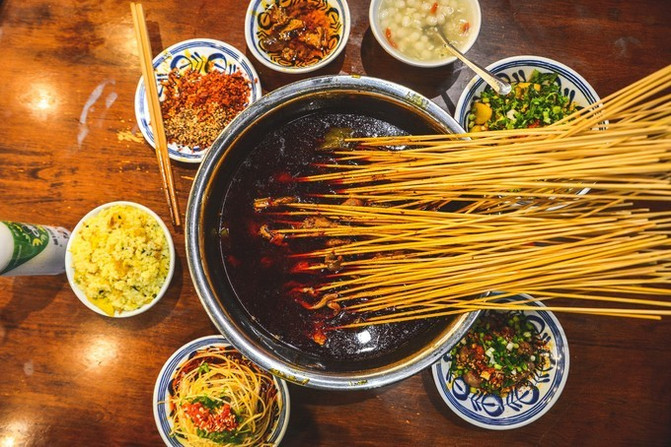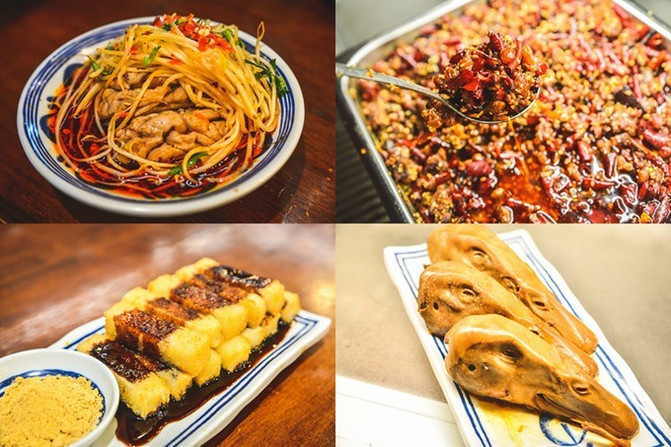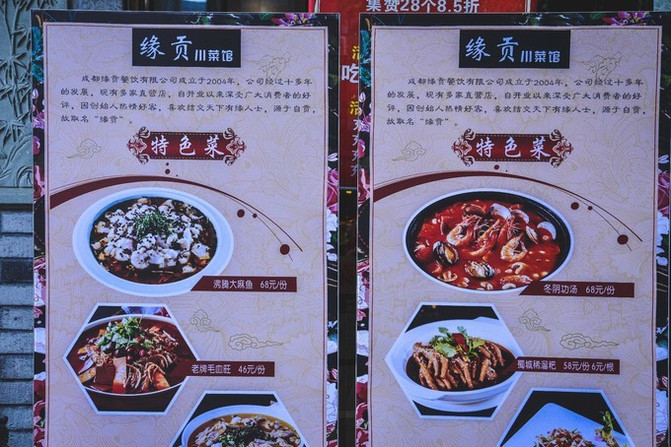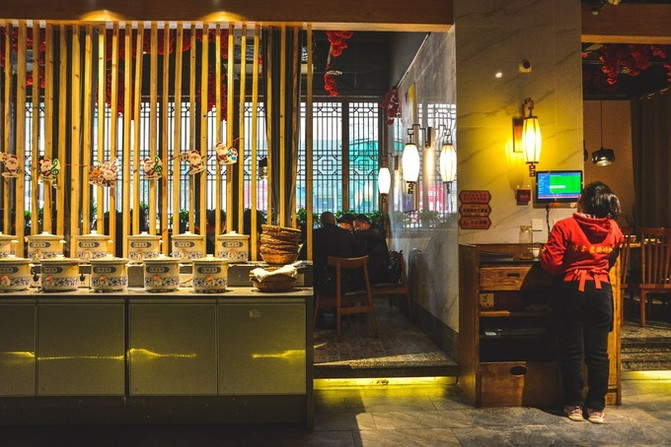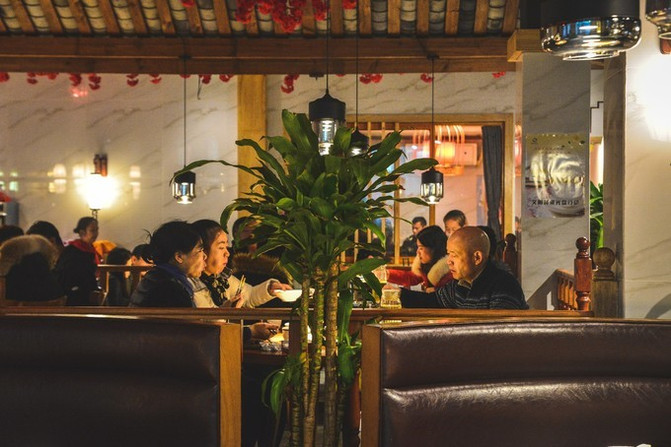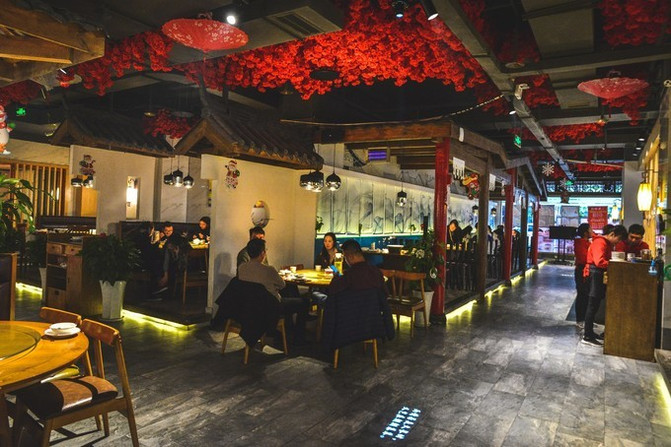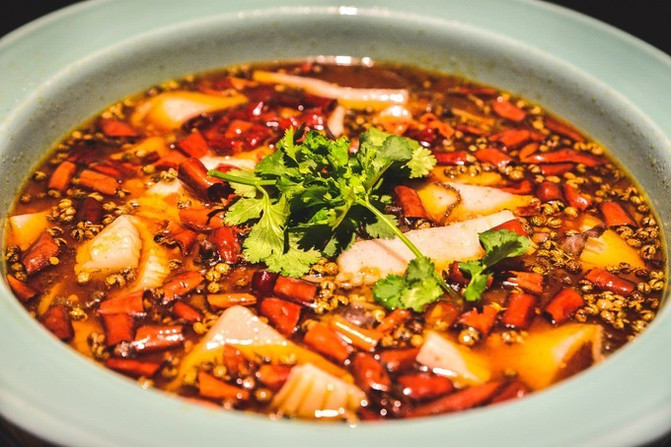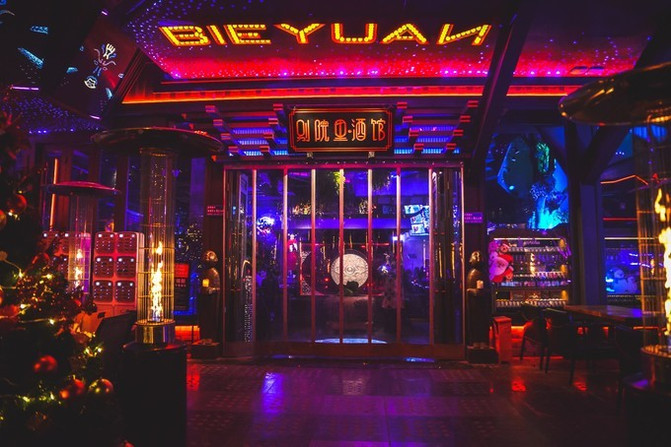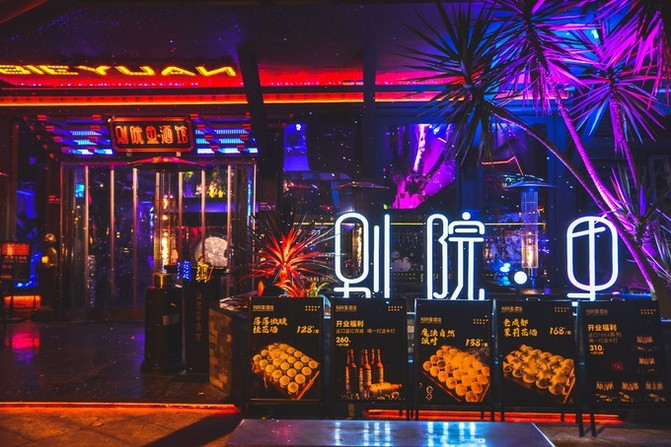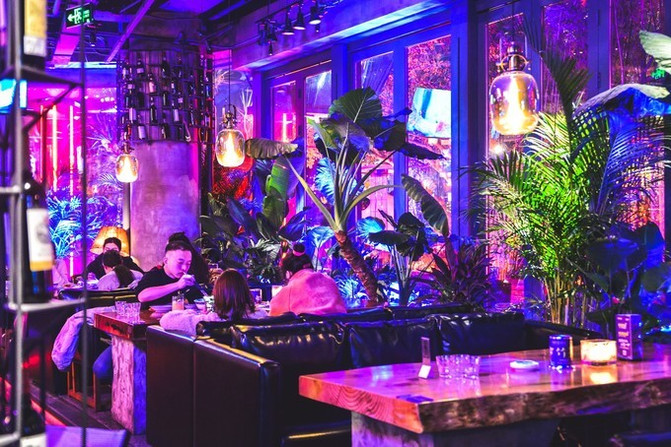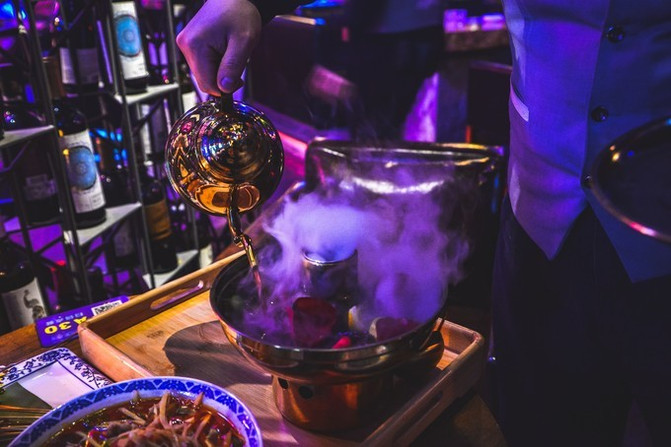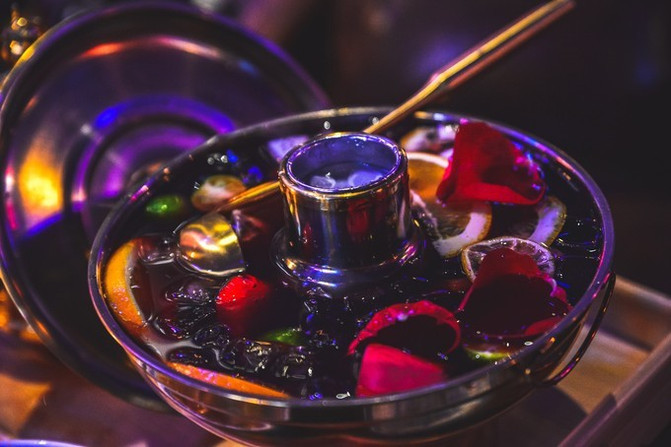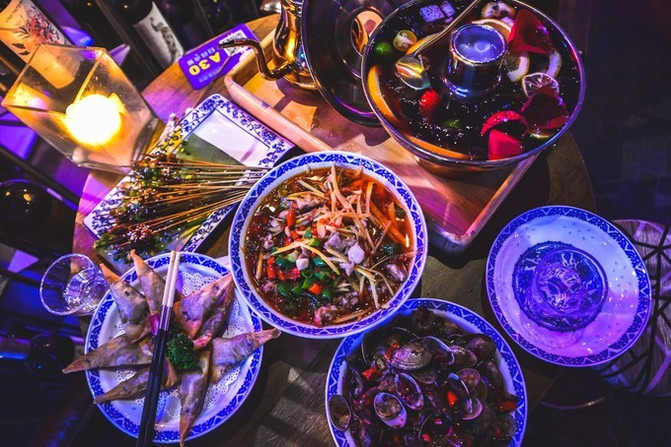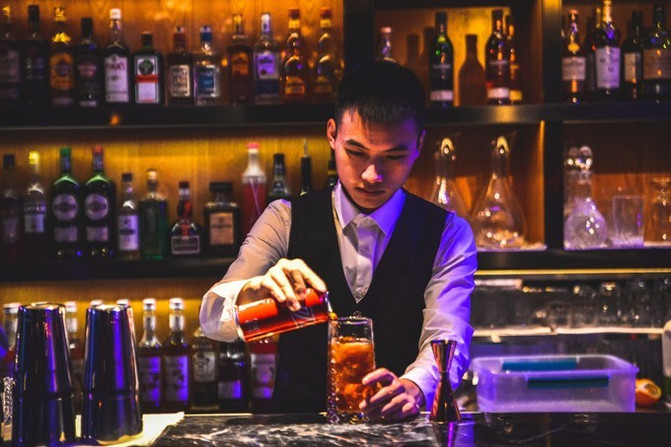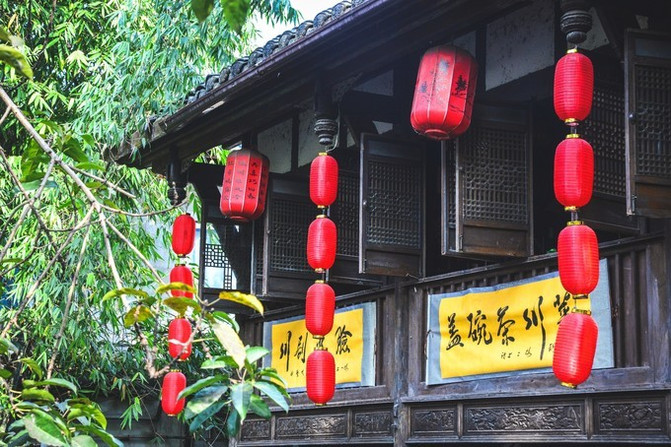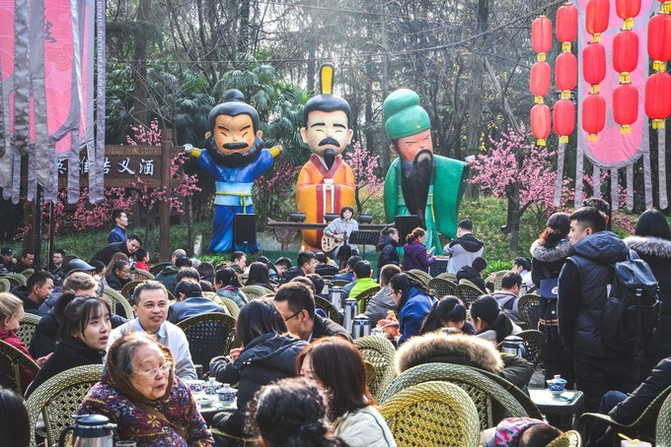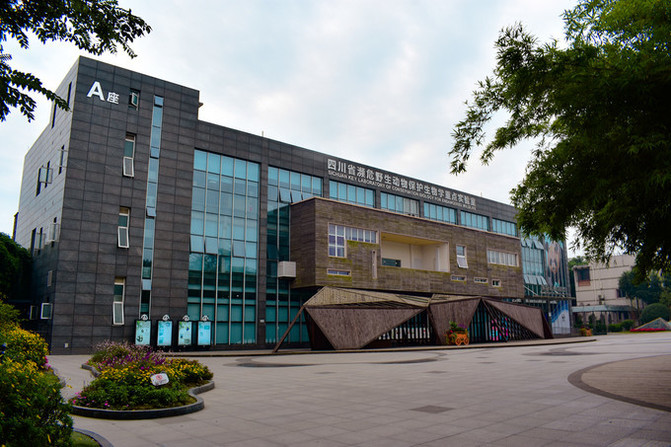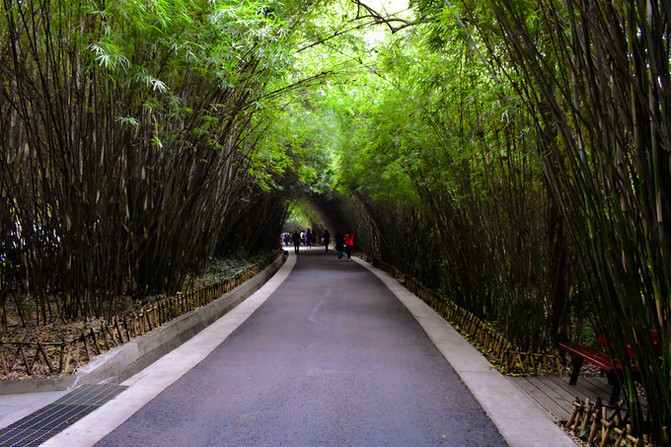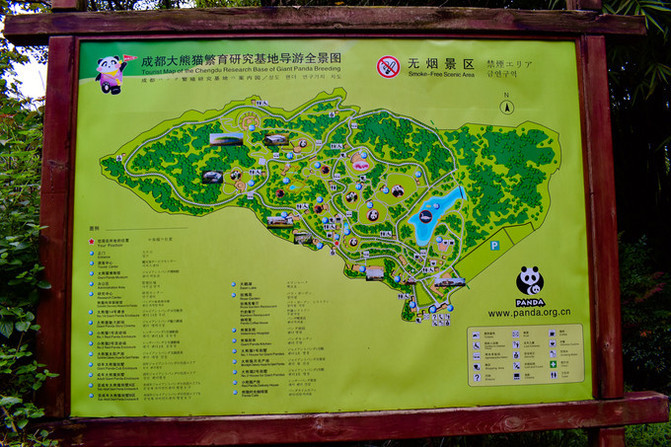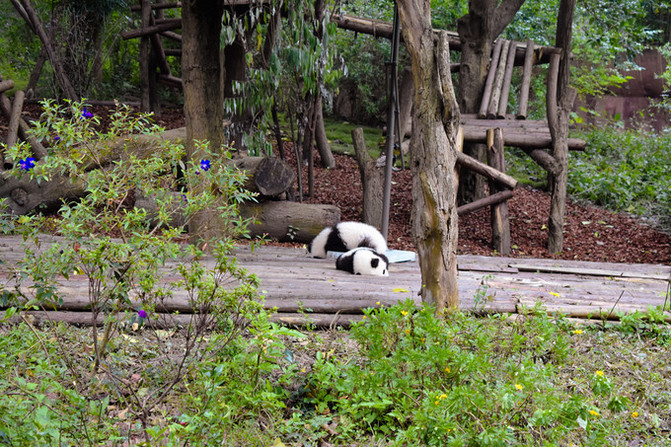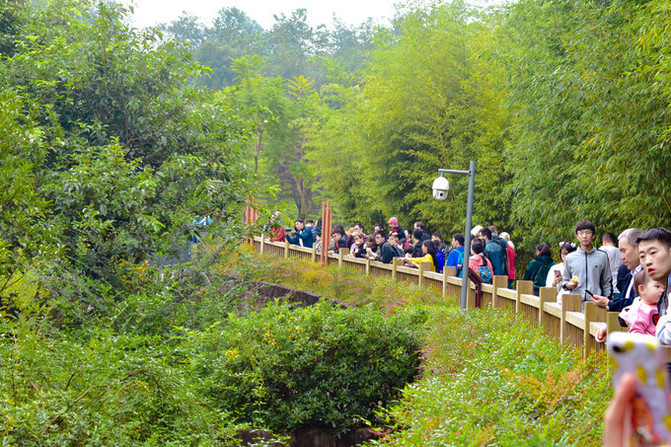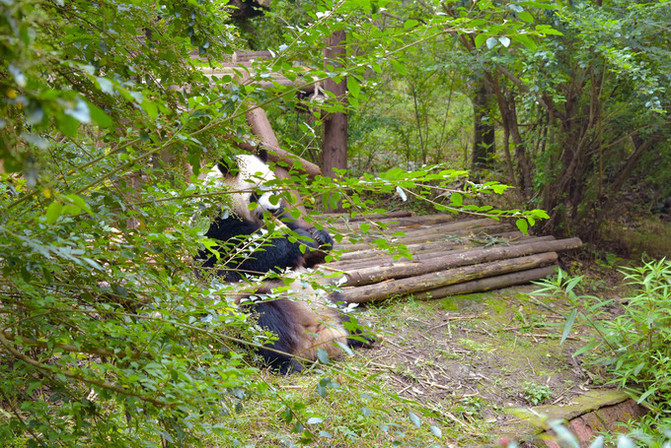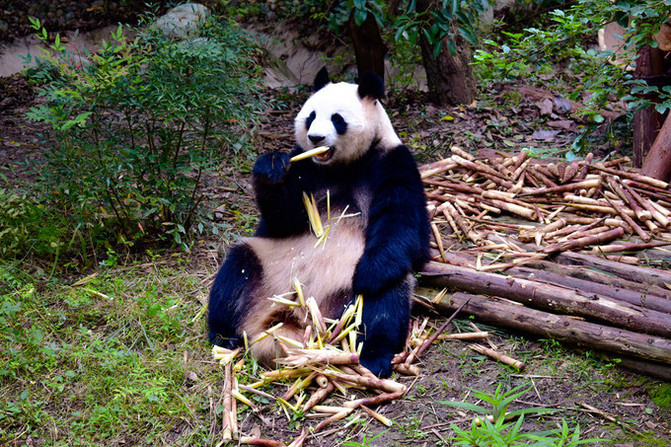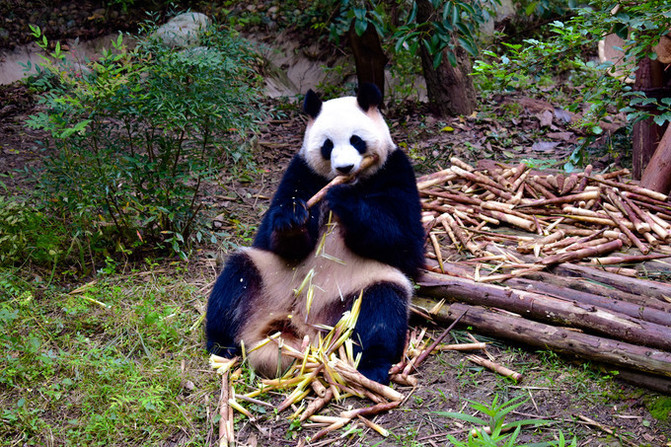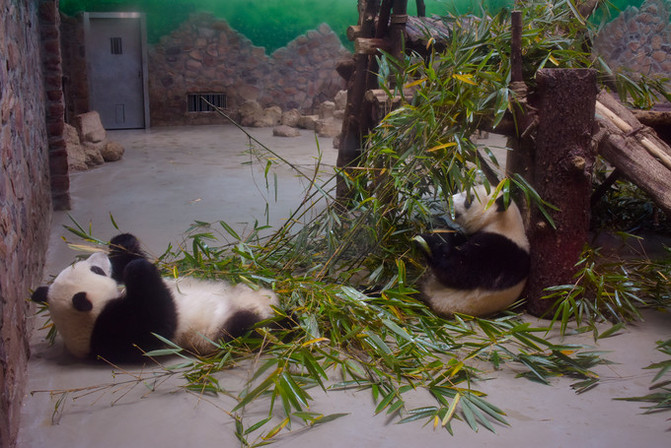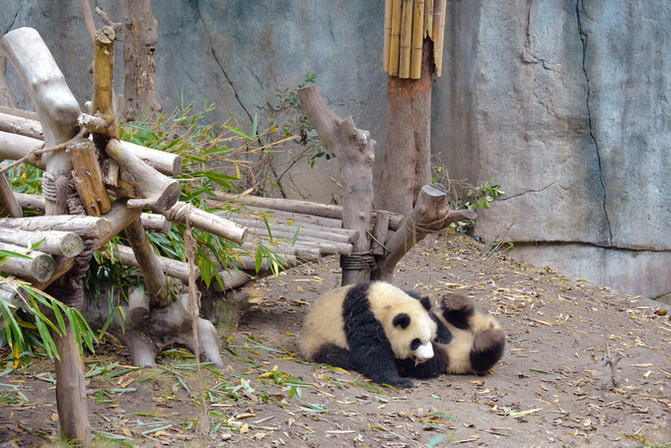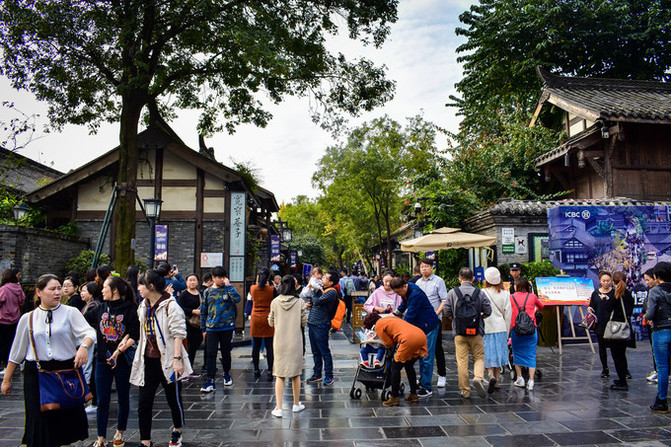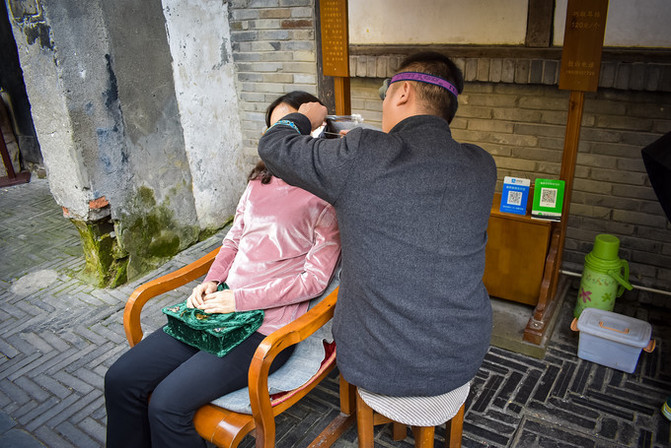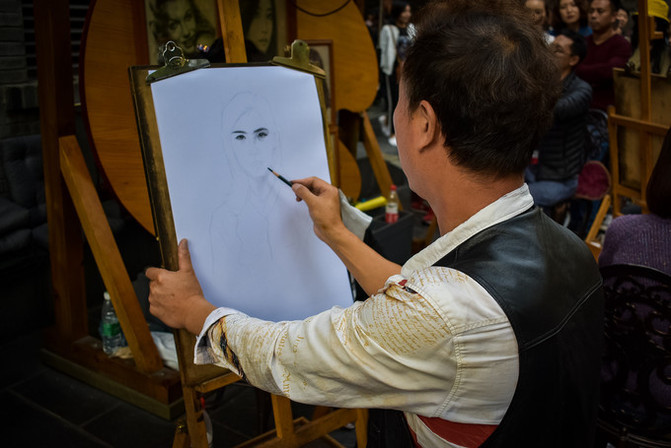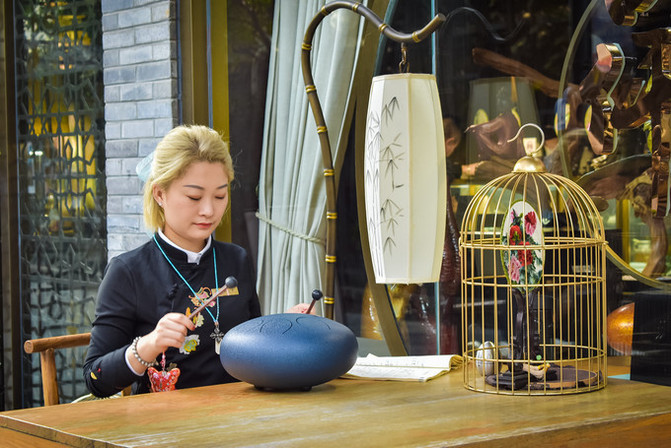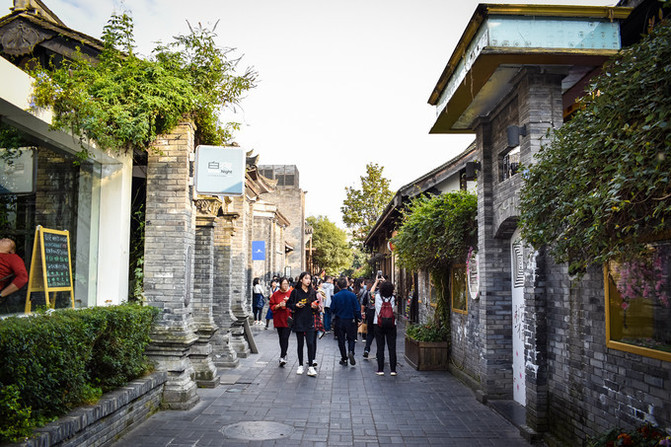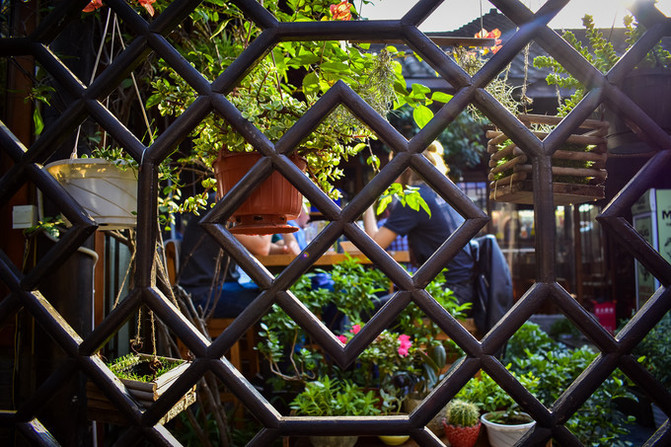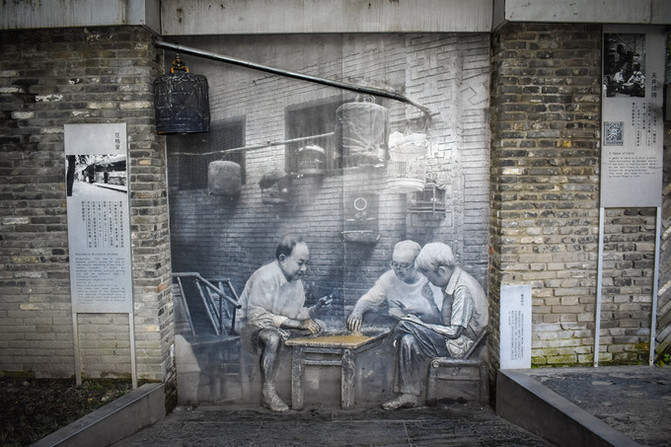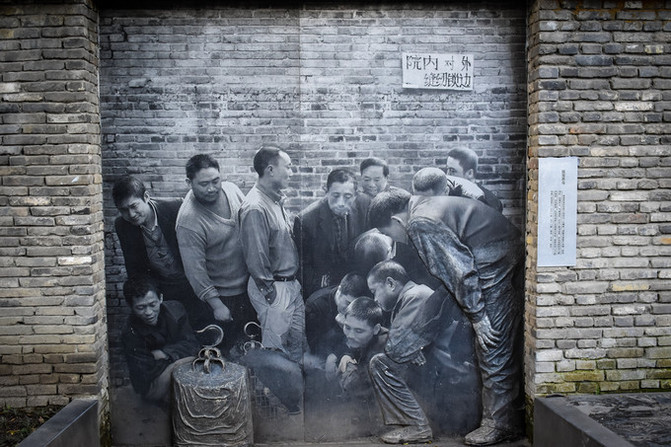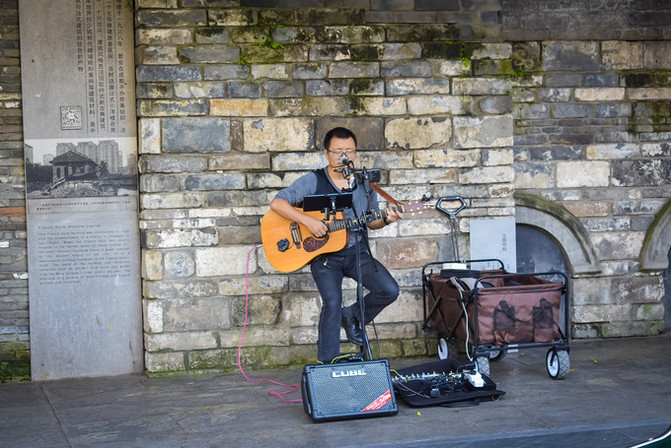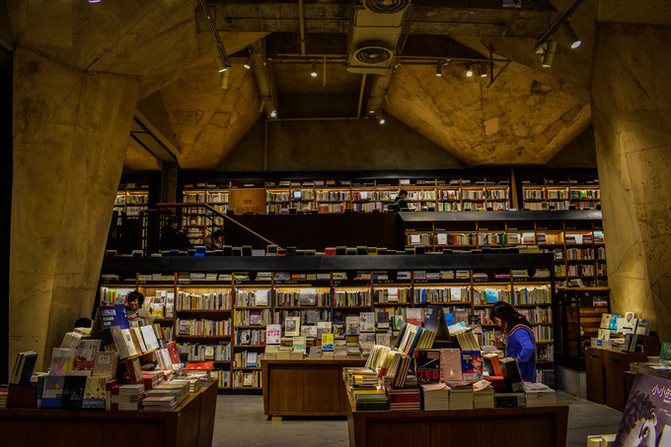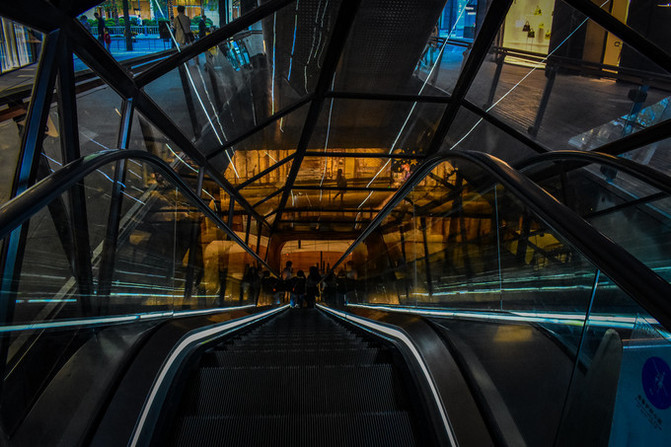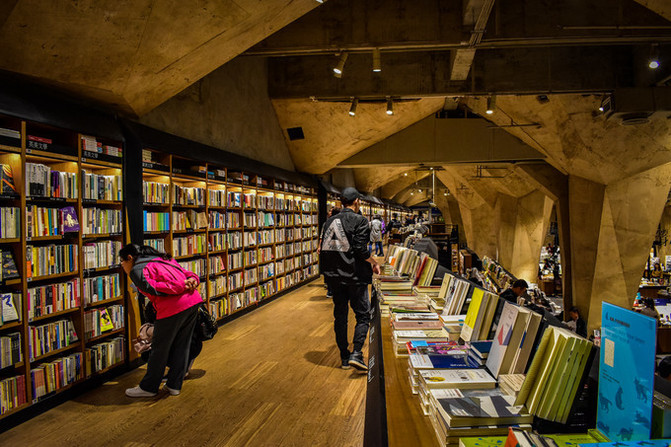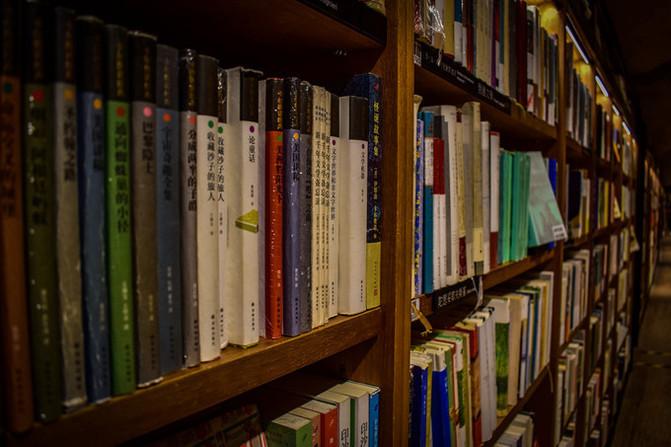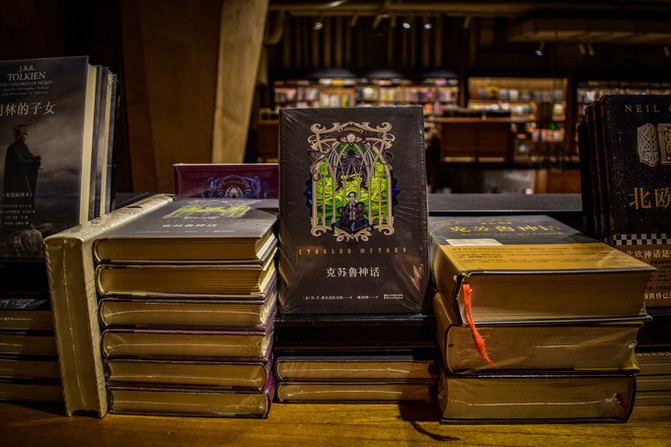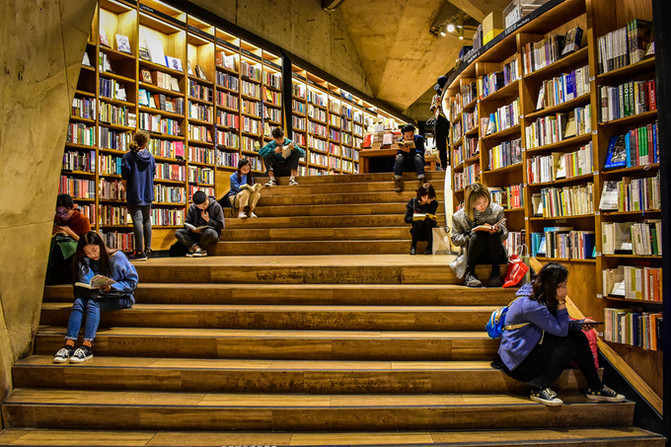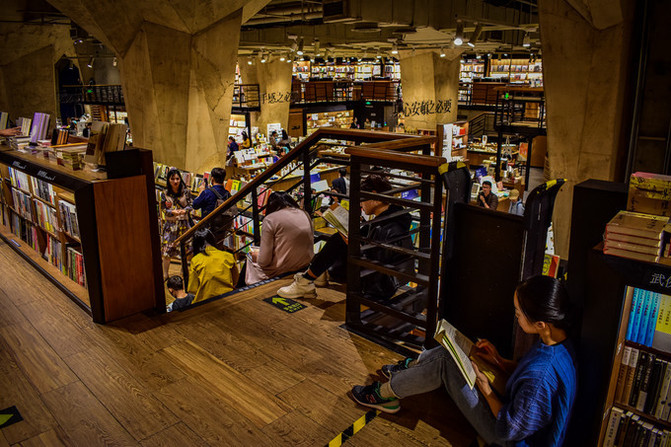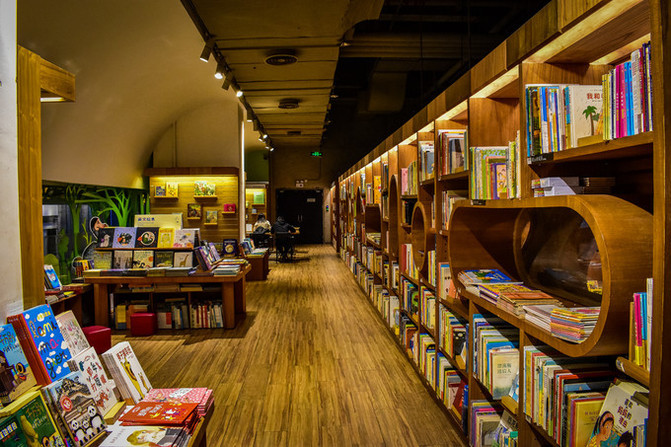[Chengdu: A city that I don't want to leave when I come here]
Since ancient times, many poets have come to Sichuan, and the land of Bashu, with outstanding people and earth, is also a land of culture! Li Taibai drank and sang happily from here with his sword. Du Fu watches the moon and cherishes his hometown here. Chen Ziang, Su Dongpo, Lu Fangweng and Zhang Daqian are like bright pearls among people, shining on this romantic land and demonstrating the beautiful scenery of Tianfu. This is Chengdu.
"One year becomes a gathering, two years becomes a city, and three years becomes Chengdu." Chengdu is the financial center of the west and a desirable tourist capital.
Li Bai said,"Nine days have opened up a Chengdu, and thousands of households and doors are like a drawing." Chengdu is a beautiful place. Even this name has an inexplicable magic power. It has the reputation of the land of abundance, leisurely, fashionable, happy, romantic...
Chengdu is a city that you don't want to leave when you come ~
[Chengdu Playing Snow-Taiziling Skiing]
Jiuding Mountain in Chengdu is one of the top ten "non-famous" peaks selected by National Geographic of China. It is known as "enjoying rhododendrons in spring, cool in summer, colorful forests in autumn, and snowy plains in winter."
Jiuding Mountain Taiziling Ski Resort is located next to National Highway 213 from Wenchuan County to Mao County in Aba Prefecture, Sichuan Province. It is located in Qinglongping in Jiuding Mountain Scenic Area, 160 kilometers away from Chengdu City. The ski resort is 2750 meters above sea level and has 4.2 kilometers of ski trails.
The concentration of negative oxygen ions in the scenic area is extremely high, and PM2.5 has been below 50 for a long time. During the operating period of the snow season, 70% of the time is good weather with high sun. The temperature can reach 25℃ during the day and about minus 10℃ at night. There is no severe cold in winter and no severe heat in summer. The climate is pleasant and it is a rare natural and pure ecological resort around Chengdu.
Taiziling Ski Resort has three difficulty ski trails: junior, intermediate and advanced, as well as multiple experience methods for single and double skiing. Skiing is a highly competitive sport, and you must choose a ski path according to your own situation.
When building ski trails on ski resorts, there are generally three types of ski trails: primary, intermediate and advanced. Tourists who are skiing for the first time and who cannot ski should choose to practice on the primary trails until they can master the skiing skills more skillfully and how to brake, slow down, accelerate, and turn, then practice on the intermediate trails. At this time, the staff of the ski resort should take corresponding responsibilities and dissuade those beginners from taking tractors into the middle and high-level ski slopes.
When tourists arrive at the ski resort, their personal safety is the biggest responsibility of the ski resort. When beginners come into contact with the ski slopes for the first time, the ski resort should have a special person to provide preliminary instructions to tourists, from the dangers of skiing, the wearing of snowshoes and skis, how to try to walk on the snow, the safety of riding a tractor, and the primary level. Deceleration skills, the direction of falling when sliding is out of control and cannot be slowed down, etc., are all things that the ski resort should teach tourists free of charge. Instead of just focusing on making money, more manpower and material resources should be invested to protect the personal safety of skiers.
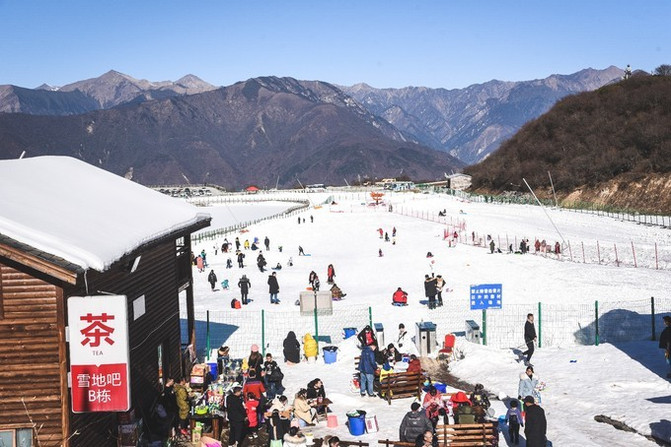
Skiers should learn to protect themselves while skiing and learn about the height, width, length, slope and direction of the ski slopes in advance with the ski resort staff. The skier flexes his arms forward and rises when starting, and then firmly supports the tip of the stick on the ground behind both sides. When skiing, the force of the two skis must be even. When skiing, look forward and relax. Skiers should learn to stay horizontally and other methods to try to avoid losing control of their bodies.
Ski resorts are not places to practice courage. If you master some skills and go on the slopes, many accidents will be avoided. You must also choose the right ski slopes based on your own level, and never overestimate your level and act rashly. To proceed step by step, it is best to hire a ski instructor.
Falling is also a way to avoid injury to yourself and others, but you must grasp the direction of the fall. If you fall out of control during sliding, you should quickly lower your center of gravity and sit back. Don't struggle at will. You can lift your limbs, bend your body, and let them slide downward. Or fall to the left and right sides of your body, so that your speed of decline can be reduced to zero in the shortest possible time. Avoid head-down and absolutely avoid rolling.
[Chengdu Cold Pot-Melon String]
Chengdu Guashuanuan is located at No. 29, Jinfangyuan East Road, very close to Exit A2 of Huazhaobi Station of Metro Line 7. This is an authentic old Chengdu restaurant, with its vermilion door opening very conspicuous on the roadside. Dating friends to hot skewers and drink beer on weekends is probably the most relaxing pastime for people after a busy week.
The inside of the room is also vermilion in classical Chinese style. Various red doors and gray tiles are painted on the walls, all of which are epitome of old Chengdu. Under the warm light, small wooden tables and small benches are full of nostalgic features.
There are countless skewers of various meats, vegetables, soy products, and eggs on the display cabinet. Just pick up whatever you like. Finally, you can count the lots to settle the bill. Each lot is 0.5 yuan. Most vegetables are one piece. There are 2 or 3 pieces of meat.
After selecting the ingredients and sending them to the kitchen for processing, they were served on the table in a fragrant manner. The room was filled with the strong aroma of the bottom of the pot. I couldn't wait to grab a handful and take a photo to show off it. The transparent bright oil wrapped the string, so happy that I couldn't help but swallow it.
In addition to the snack series on the roadside, it is also the signature of the store. Maoxiang, roasted brain flowers, tender beef, and brown sugar glutinous rice cake are highly recommended.
[Chengdu Shu Flavor-Yuangong Sichuan Cuisine]
Yuangong is an authentic Sichuan cuisine restaurant located near No. 87 Xuedao Street and very close to Chunxi Road Station of Metro Lines 2 and 3. I was hungry at noon, so I walked nearby and saw this Sichuan cuisine restaurant with a good business. The big money board at the door is very eye-catching, and the recommended specialties look good.
The clerk warmly welcomed him in and walked into the store and found that there were many people dining. Almost all of the tables were full. This shows that this store has a good reputation. Looking around the entire dining hall, the air is filled with the unique spicy flavor of Sichuan cuisine. From the corner of my eye, I saw that there was still an empty seat in the corner, so I quickly sat down and asked the waiter to order...
I ordered a set meal for two with three dishes and one soup, which was less than a hundred yuan. There are also set meals for 4 people, set meals for 6 people, etc., and the prices are still very affordable.
The speed of serving is very fast. The boiled water is crispy and highly recommended. You can tell its taste from the name. Although there is a layer of pepper on it, it is not unacceptable to taste. In fact, the spicy taste is still very strong in terms of smell, and it is very fragrant in the mouth.
[Chengdu Never Night-Bieyuan Tavern]
Bieyuan Tavern is located at No. 96 Mengzhuiwan, Chenghua District, near the 339 TV Tower. Since he lives near Tai Koi, he does not take a taxi and directly chooses to ride a shared bicycle. The tavern in the Biyuan belongs to the kind of relatively quiet clean bar. The entire store is still designed to be very tall and petty.
The pub has two floors in total. We found a good location on the first floor. The large tables next to it seem to have been booked. When ordering drinks, the clerk will ask you for alcohol content and sweetness. It is very considerate.
After ordering a fancy hot pot wine, the clerk served it directly to the bar pan. This was the first time I saw using hot pot as a wine container. It was full of ice cubes and fruits, and then I added it later. It was very interesting to have fairy mist. Due to the various patterns added to it, there were really rose petals inside. The taste was very smooth and had a sweet aroma.
The casual snacks in the pub are also very delicious, including spicy garlic, fried rabbit diced, and kebabs.
There are resident singers in the bar, and different styles of music will reach their ears every fixed time. Many people also come for this reason. In the dark corner, there is only musical greetings. Silently playing with the wine cup in his hand, the crystal liquid seemed to have a glimmer. Strangers sat in twos and threes, confiding to each other. The singer's infectious voice slowly filled the air! The night in Chengdu is extraordinary ~
[Chengdu Culture-Wuhou Temple]
Wuhou Temple is located in Wuhou District, Chengdu City, Sichuan Province. It began when Liu Bei's Huiling Mausoleum was built in 223 AD. It is the only temple in China where monarch and minister worship together and the most famous memorial site for Zhuge Liang, Liu Bei and the heroes of the Shu and Han Dynasties. It is also the most influential museum of relics of the Three Kingdoms in the country.
The plaque at the main entrance of the ancestral hall is "Han Zhaolie Temple." In the shady bushes inside the gate, there are six stone monuments, with a monument corridor on each side. The largest one is in the east monument corridor. The Tang Dynasty "Temple Monument to Zhuge Wuhou, the Prime Minister of Shu Han Dynasty" was erected in the fourth year of Yuanhe of Emperor Xianzong of the Tang Dynasty (AD 809). It has high cultural relics value and is a national-level cultural relic. It is called the "Sanjue Monument" due to its excellent writing, calligraphy and carving skills.
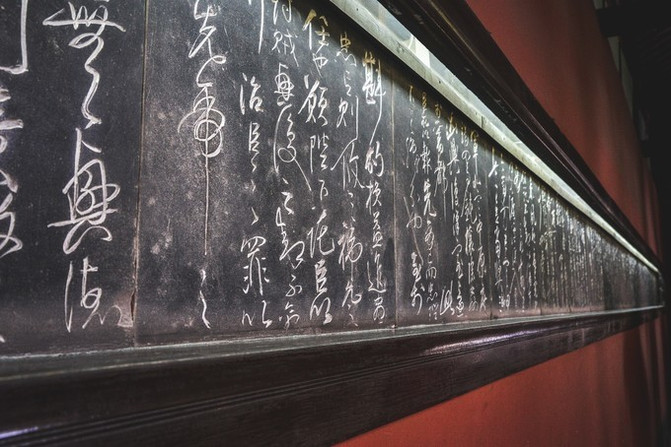
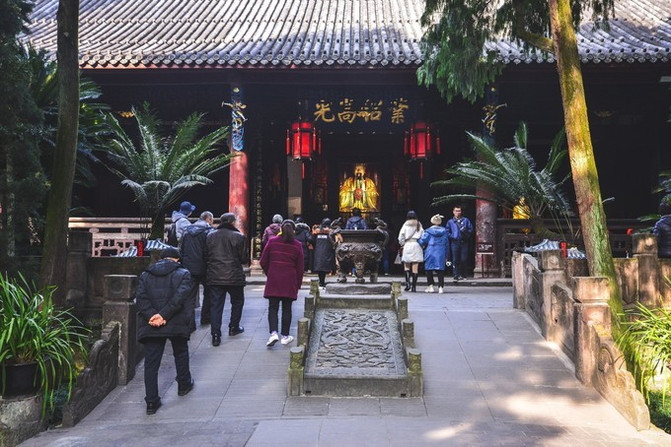
Behind the second gate is Liu Bei Hall, also known as Zhaolie Temple. In the middle is a gold-plated statue of Liu Bei, 3 meters high, full and solemn appearance, and large ears hanging down his shoulders. Accompanying the sacrifice on the left is the portrait of his grandson Liu Chen, King of Beidi. The statue of Liu Bei had a statue of his son Liu Chan, the Latter Ruler of the Shu Han Dynasty. Because Liu Chan was fatuous and incompetent, he could not maintain his foundation and lost his power and humiliated the country, he was removed by Sichuan local officials during the Song Zhenzong, and was not rebuilt later. When Liu Chan, the Latter Ruler of Shu Han Dynasty, surrendered to Wei, his son Liu Chen went to Liu Bei's tomb to cry and worship, killed his family and committed suicide. On both sides of the side halls, there are statues of Guan Yu, son and Zhou Cang on the east, and statues of Zhang Fei's ancestors and grandchildren on the west, showing the different appearances and personalities of Guan and Zhang, and reflecting their common characteristics of superior martial arts and extraordinary bravery. The east and west corridors on both sides are decorated with fourteen sitting statues of Shu Han civil officials and generals. On the east side, Langfang is led by Pang Tong, and on the west side, the military gallery is led by Zhao Yun. Each statue is life-sized, with a small stone tablet standing in front of the statue, with its name and life history printed for easy understanding by visitors.
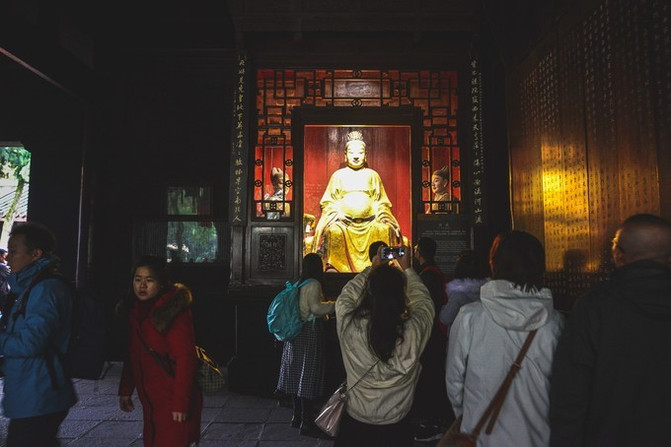
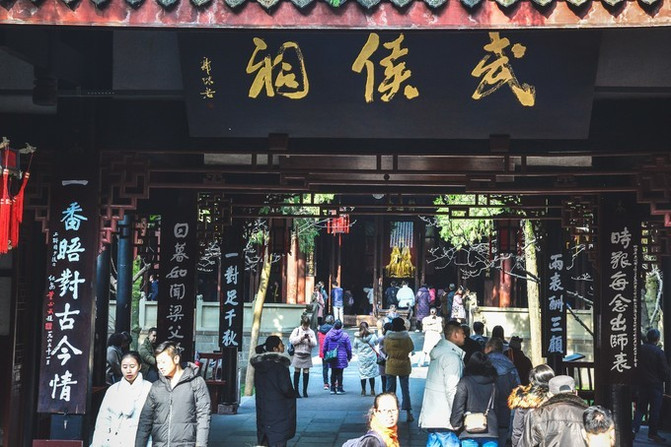
Behind Liu Bei's Hall, a few steps down is an entrance hall with a plaque of "Wuhou Temple" hung. Wuhou Temple is an ancestral hall in memory of Zhuge Liang, the prime minister of the Shu Han Dynasty during the Three Kingdoms period. Zhuge Liang was awarded the title of "Wuxiang Marquis" during his lifetime and was posthumously named "Zhongwu" after his death. Therefore, the ancestral hall in memory of him is called the "Wuhou Temple." A plaque "Famous in the Universe" hangs in the Hall of Zhuge Liang, and on both sides a book "Heart Attack" was written by Zhao Fan, a Qing Dynasty man:"If you can attack the heart, you will disappear. Since ancient times, it has been known that soldiers are not warlike. If you don't judge the situation, you will be lenient and strict. Later, you must think deeply in governing Shu. "The couplet is a well-known couplet. Based on the analysis and summary of the success and failure of Zhuge Liang, the Shu Han regime and the Liu Zhang regime, it reminds future generations to learn from the experience and lessons of their predecessors when governing Shu and governing the country, and to pay special attention to" attacking the heart "and" judging the situation." Statues of three generations of Zhuge Liang's ancestors and grandchildren are enshrined in the main hall. In the center of the hall is a gold-covered statue of Zhuge Liang wearing a turban and holding a feather fan. According to legend, the three bronze drums in front of the statue were made when Zhuge Liang led his troops to the south and are known as the "Zhuge Drum." There are exquisite patterns on the drum, which are precious historical relics.
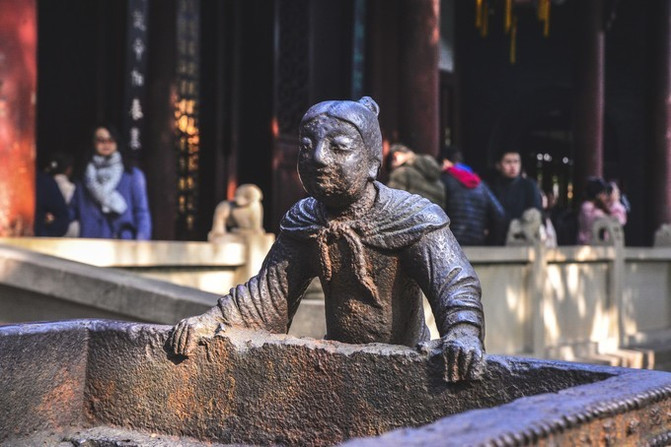
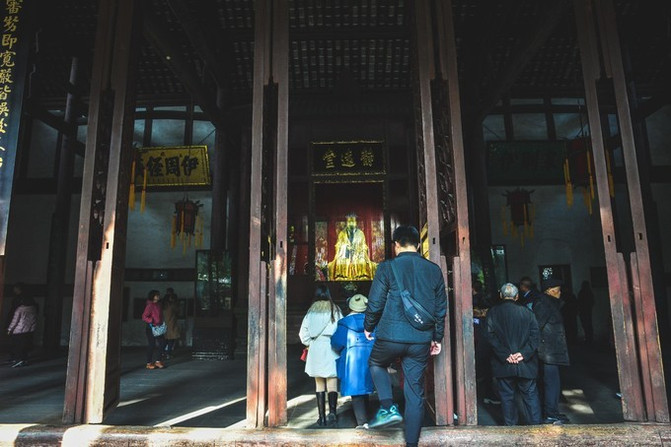
Wuhou Temple has a very famous Internet celebrity wall. Many people will find it here to check in and take photos when they come to Wuhou Temple. The winding red wall shuttles through these historical memories. Although it is not long, it is particularly conspicuous.
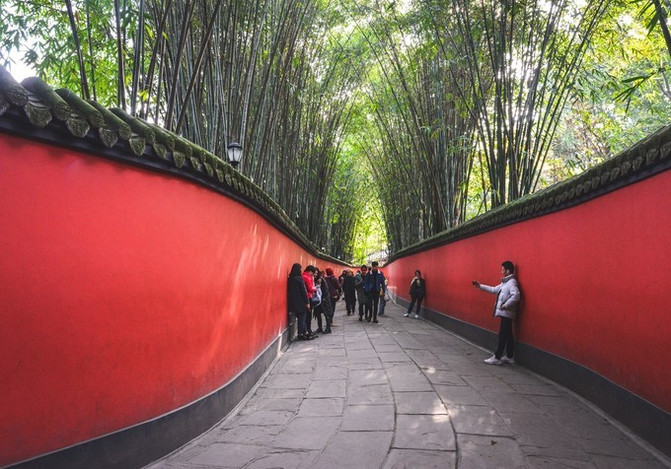
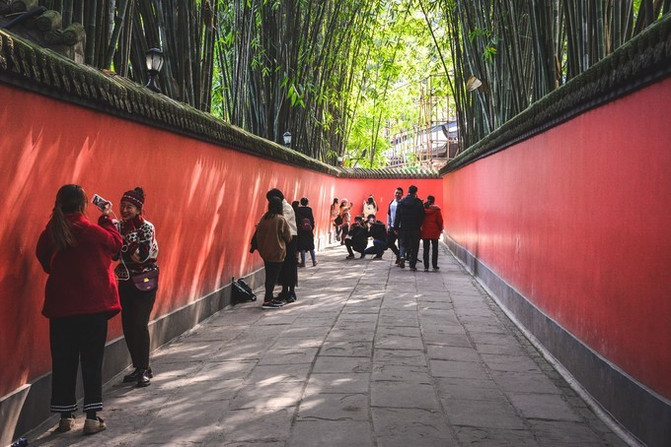
On the west side of Zhuge Liang Hall is Liu Bei's tomb, known as "Huiling" in history. Zhuge Liang personally selected the precious land to bury Liu Bei here. "Annals of the Three Kingdoms·Biography of the First Lord" records:"In August, Huiling was buried." According to the "posthumous law","loving the people and loving peace is called 'Hui'," hence the name Liu Bei's tomb is called "Huiling." Liu Bei's two wives, Gan and Wu, were also buried together in the tomb. In front of Liu Bei's tomb, there is a stone tablet "Mausoleum of Emperor Zhaolie of the Han Dynasty" erected during the Qianlong period of the Qing Dynasty. The tomb building consists of Zhaoli, fence doors, Shinto, sleeping halls, etc. There is a smaller Shinto in front of the mausoleum built in the Qing Dynasty. Huiling, like the main buildings of Wuhou Temple, faces north to south, and is immediately adjacent to the west side of Han Zhaolie Temple and Wuhou Temple. It is connected to the Wuhou Temple by red walls and roads.
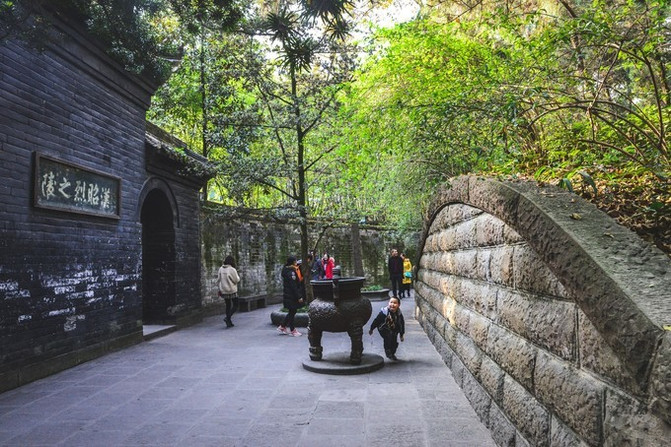
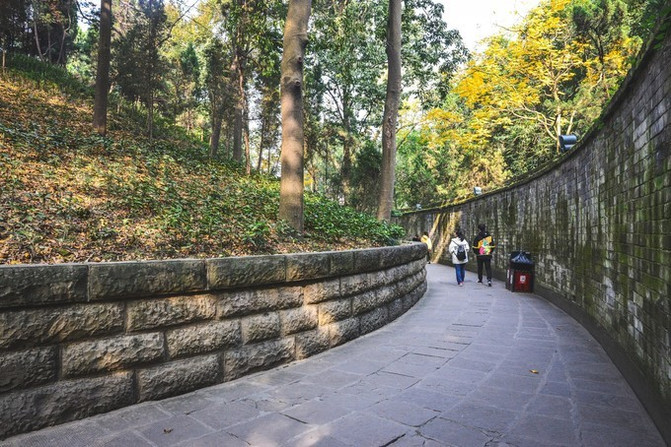
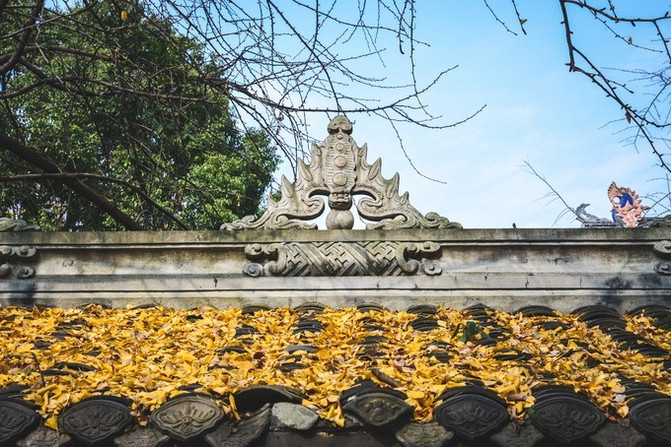
[Chengdu Ancient Lane-Jinli Ancient Street]
Jinli Ancient Street is located on Wuhouci Street, Wuhou District, Chengdu City. It is said that Jinli was once one of the oldest and most commercial streets in the history of Western Shu. It was famous nationwide as early as the Qin, Han and Three Kingdoms periods. It is relatively convenient to take transportation to Jinli in Chengdu. You can take buses such as No. 1, No. 21, No. 57, No. 334, and No. 335 in the city, as well as Metro Line 3, and then walk to Jinli.
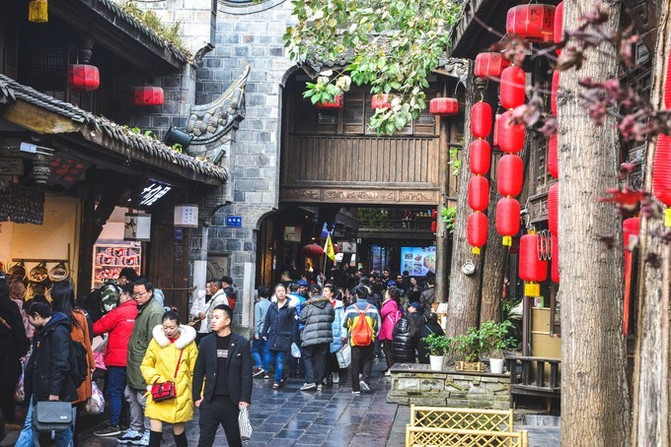


Jinli Ancient Street is 550 meters long. It has now become a famous pedestrian commercial street in Chengdu City. Most of the buildings inside are antique buildings in the architectural style of the late Qing Dynasty and the early Republic of China, with the culture of the Three Kingdoms and traditional Sichuan folk culture as the main content. The layout of the ancient street is rigorous and orderly, with bar and entertainment areas, Sichuan famous restaurants and snacks areas, mansion inn areas, and special tourism and crafts exhibition areas.
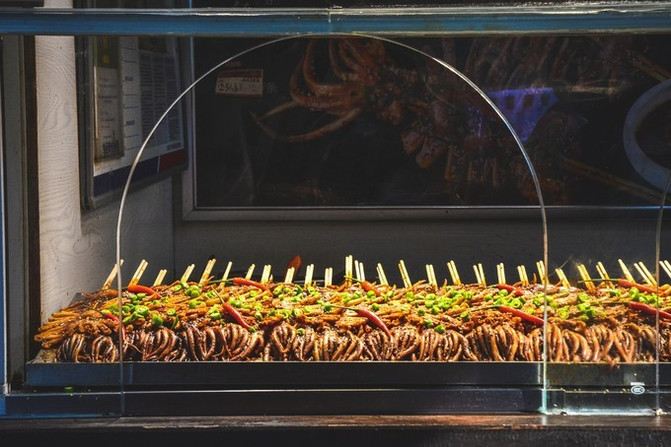
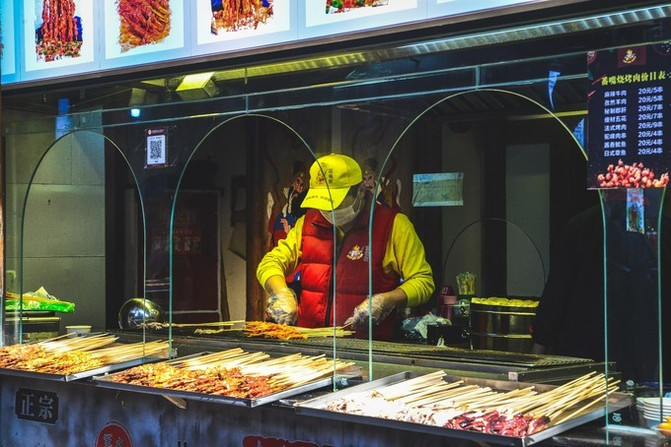
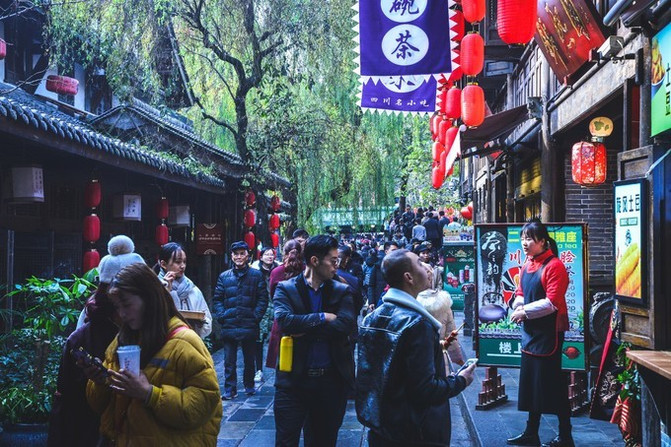
Sichuan snacks have a long history, a wide variety, each with its own flavor. In Jinli, not eating snacks is the biggest regret. There are countless famous sugar-oil fruits, three cannons, Juntun pot helmets, beef charred cakes, yellow glutinous rice, etc. Sichuan snacks have a long history, a wide variety, each with its own flavor. In Jinli, not eating snacks is the biggest regret. There are countless famous sugar-oil fruits, three cannons, Juntun pot helmets, beef charred cakes, yellow glutinous rice, etc.
Jinli Snack Street collects all snacks from all places in Sichuan into the street, makes them on-site, sells them on the spot, and some are eaten and some are viewed. People who come to Chengdu just play and stroll around Jinli leisurely. Nostalgic people have an outlet for emotions, and people who love to eat satisfy their appetite.
[Chengdu Mengbao-Giant Panda Base]
The Chengdu Giant Panda Breeding Base is located in Futou Mountain in the northern suburbs of Chengdu City, more than 10 kilometers away from the urban area. There is a wide Panda Avenue connected to the urban area. It takes about 40 minutes to get there by car. It has become one of the main bases in China for ex-situ protection of rare and endangered wild animals such as giant pandas. Animals such as giant pandas, red pandas, black-necked cranes, white storks and white swans, black swans, geese, mandarin ducks and peacocks are raised all year round. Of course, I definitely came to Chengdu mainly to see our national treasure giant pandas.
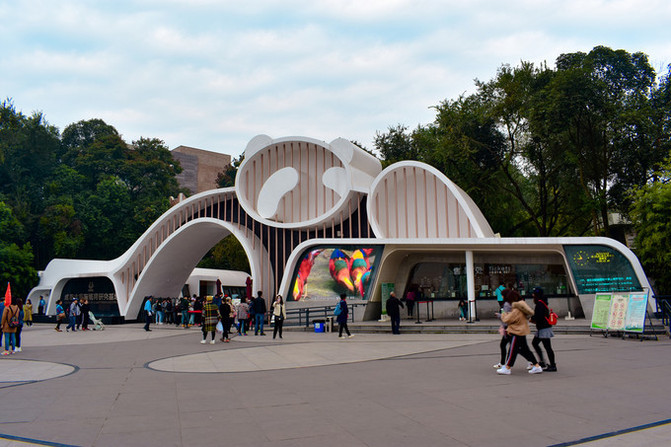
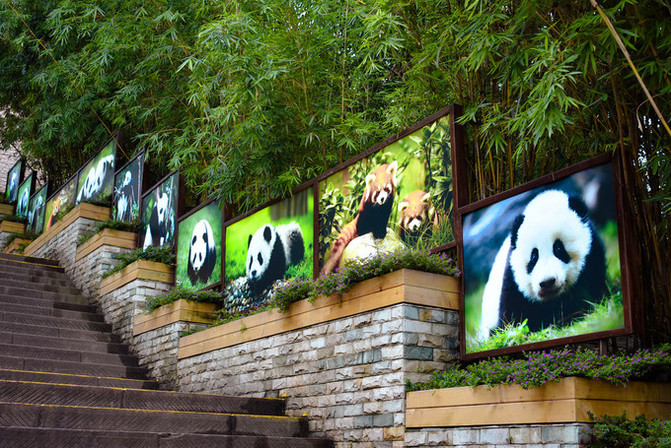
You must go early to see giant pandas at the breeding base. There will be some feeding at noon. The giant pandas will doze off after lunch and are almost not very energetic in the afternoon. It is best to go and see them in the morning. The base has a large area and many subdivisions, and many small roads are circuitous and easy to get lost. However, there are many domestic and foreign teams visiting the Panda Base, so it's okay to follow behind them, and they can also listen to free explanations.
I arrived at the panda base at around ten o'clock in the morning. Some of the red pandas had already begun to doze off and crawled on the ground without moving.
Red pandas are generally quite shy. They hide in the tree hole and refuse to come out while being watched by so many people. They stick their heads out from time to time to satisfy people's curiosity, making them so cute.
In contrast, we have seen a lot of giant pandas in the world. I eat mine, you take your pictures, take one from the front and one from the side, as long as you are happy. She looked like a big idol star.
But to be honest, the giant panda's upper limbs are really dexterous, and its posture of grasping bamboo shoots is particularly skillful. After eating, he takes one after another. Coupled with his round figure, he is also a complete foodie. Although it is cute and cute, it never swallows food. It picks up the bamboo shoots, uses its teeth to peel off the outer parts layer by layer, and only eats the buds inside. This is also a tasteful eater.
Giant pandas belong to the only mammal in the order Carnivora, Uridae, the subfamily Giant Panda and the genus Giant Panda. That's right, it's the order Carnivorous. In fact, 90% of people don't know it. In fact, giant pandas originally ate meat. After evolution, 99% of their food was bamboo, but their teeth and digestive tract remain intact, so they are still classified as the order Carnivorous.
Young red pandas, like children, like to play and chase each other. They have round cheeks, big dark circles under their eyes, plump bodies, their iconic eight-character walking style, and sharp claws like scalpels.
Giant pandas have existed on earth for at least 8 million years and are known as "living fossils" and "national treasures of China". When traveling to Chengdu, you must check in here to get a closer look at these cutest animals in the world.
[History of Chengdu--Wide Alley]
Kuanzhai Alley is located near Changshun Street, Qingyang District, Chengdu City, Sichuan Province. It consists of a wide alley, a narrow alley, and a well alley arranged in parallel. It is all antique courtyards made of indigo bricks and tiles. It is also a relatively large-scale ancient street of the Qing Dynasty left in Chengdu. Together with Daci Temple and Manshu Yuan, it is called the protected district of Chengdu's three major historical and cultural cities.
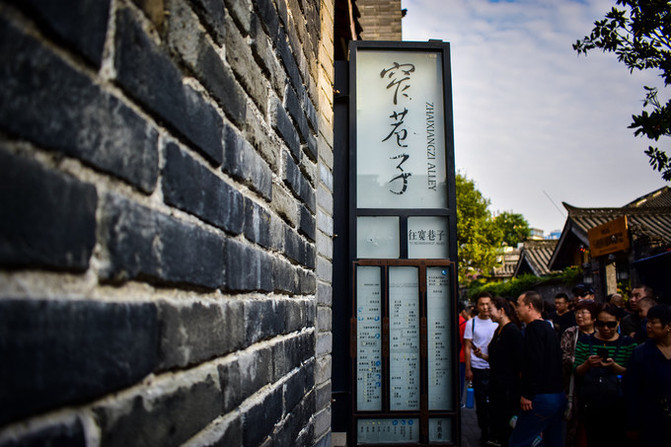
In the fifty-seventh year of Kangxi, after putting down the Jungar Rebellion, more than a thousand soldiers were selected to garrison Chengdu, and Mancheng was built on the basis of Shaocheng at that time. In the Qing Dynasty, only the Manchu Eight Banners lived in Mancheng. After the decline of Manchu Qing Dynasty, Mancheng was no longer a restricted area and people could enter and exit freely. Some foreign merchants took the opportunity to open pawn shops near Mancheng and purchased large quantities of the property of the flag bearers. A unique pattern has been formed in which descendants of flag men, dignitaries, and peddlers live all over the city. At this time, the wide alley was called Xingren Hutong, the narrow alley was called Taiping Hutong, and the well alley was called Ruyi Hutong.
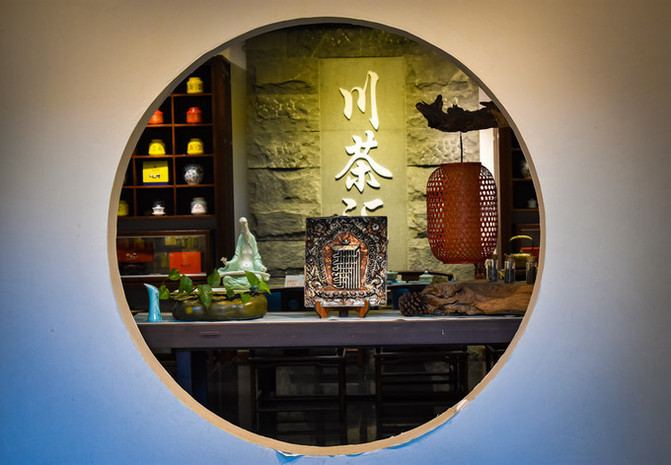
After the Revolution of 1911, Zhao Erfeng, the governor of the Qing Dynasty, later surrendered power and demolished the city wall of Shaocheng. Some high-ranking officials and dignitaries came here to build residences and private houses. Yu Youren, Tian Yongyao, Li Jiayu, Yang Sen, Liu Wenhui and others successively settled here. Chiang Kai-shek also came here, allowing these ancient buildings to be preserved. In the early years of the Republic of China, the city managers at that time changed the hutongs into alleys. Kuan Alley is a leisure and living area and a reproduction of old Chengdu life. There is the Old Chengdu Life Experience Hall on the wide alley, where both the customs and old Chengdu folk customs are here.
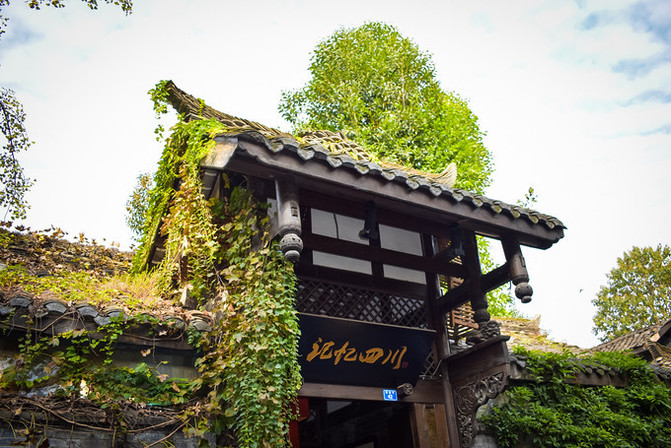
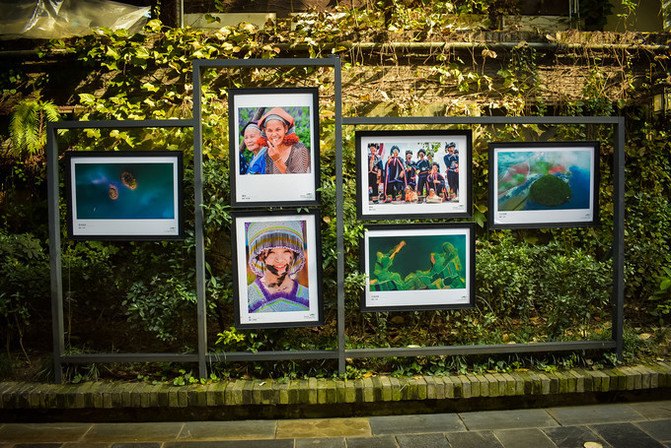
There is a profession in Chengdu called ear picking, which is ear picking. They can be seen in many famous streets and alleys, and the wide and narrow alleys are no exception. There are three great joys among the people: picking ears, pinching feet, and bathing. Ear picking is to use various ear picking tools to stimulate the inside and outside of the ear hole, so that people can enjoy and relax after itching and tension! In addition to cleaning ear holes, it can also relieve stress and enjoy.
There are many buildings in the narrow alleys from the late Qing Dynasty and the early Republic of China, including some Western-style buildings left by the church. Narrow alleys are slow living areas, showing the courtyard culture of old Chengdu. Most of these courtyards are occupied by stylish bars and restaurants. Tourists and cultural people hang out in the alleys and spend the entire afternoon leisurely and feel the pause of time.
There are relatively few people in Jingli Lane, and it is close to the south of the narrow alley. The shops here are not as prosperous as the business in the two narrow alleys. The biggest attraction is that on the outer wall of the alley, there is a 500-meter-long brick culture wall of past dynasties and a 500-meter-long folk photo wall.
[Chengdu Time-Fangsuo Bookstore]
Fangsuo Bookstore is located on the basement floor of Yuanyang Taikoli, No. 8 Zhongshamao Street, Jinjiang District, Chengdu City. At first, I searched up and down several times according to my mobile phone map. There are multiple descending stairs here. In fact, there are guide maps next to each descending escalator, but I didn't notice it at first.
When I first arrived, I was still amazed by the size of the bookstore. The bookstore is very large. On the right side of the entrance b are restaurants, food books, and children's books. On the left side of the entrance is the main body of the bookstore, which is divided into two floors. The lower layer is stationery, plants, and various books. The upper layer has more books and clear zoning. Europe, Asia, Hong Kong and Taiwan, architecture, design, etc. Each box of the bookcase also has the author's name or search prompt.
For people who abandon electronic devices and like to read books, Fangshu is an elegant and comfortable paradise. Here you can hold a book, sit on a chair, stairwell or on the floor of the corridor, and quietly enjoy the afternoon.



